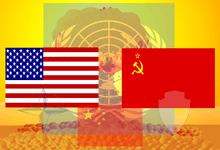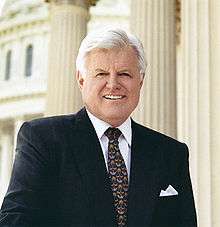Edward Moore "Ted" Kennedy (22 February 1932 – 25 August 2009) was the senior Democratic U.S. senator from Massachusetts. In office from November 1962 to August 2009, Kennedy was, at the time, the second-longest serving member of the Senate, after Robert Byrd of West Virginia.
Quotes
- Love is not an easy feeling to put into words. Nor is loyalty, or trust, or joy. But he was all of these. He loved life completely and he lived it intensely.
- Eulogy for Robert F. Kennedy at St. Patrick's Cathedral, New York (8 June 1968)
- My brother need not be idealized or enlarged in death beyond what he was in life, to be remembered as a good and decent man, who saw wrong and tried to right it, saw suffering and tried to heal it, saw war and tried to stop it.
- Eulogy for Robert F. Kennedy (8 June 1968)
- Wanted or unwanted, I believe that human life, even at its earliest stages, has certain rights which must be recognized – the right to be born, the right to love, the right to grow old....When history looks back to this era it should recognize this generation as one which cared about human beings enough to halt the practice of war, to provide a decent living for every family, and to fulfill its responsibility to its children from the very moment of conception.
- and http://online.wsj.com/article/SB123086375678148323.html a private letter from August 3, 1971 in response to New York's legalization of abortion
- In fact, the legal system is in part responsible for their very size and growth. And too often when the individual finds himself in conflict with these forces, the legal system sides with the giant institution, not the small businessman or private citizen.
- On big business and big government; speech before American Bar Association, New York (August 8, 1978), reported in Alan F. Pater, Jason R. Pate, What They Said in 1978 (1979), p. 168.
- For me, a few hours ago, this campaign came to an end. For all those whose cares have been our concern, the work goes on, the cause endures, the hope still lives, and the dream shall never die.
- Concession speech in his campaign for nomination as the Democratic Presidential candidate against incumbent Jimmy Carter at the Democratic Convention in New York City (12 August 1980).
- This has sometimes been misquoted as "The work goes on, the cause endures, the hope still lives and the dreams shall never die."
- I hope for an America where neither "fundamentalist" nor "humanist" will be a dirty word, but a fair description of the different ways in which people of good will look at life and into their own souls.
- Speech on "Truth and Tolerance in America," Oct. 3, 1983, Lynchburg, Va. Cited by latimes.com, 26 August 2009
- I won't yield to anyone about guns in our society. I know enough about it.
- Senate debate with Mitt Romney (1994). Cited by biography
- Never say in grief you are sorry he's gone. Rather, say in thankfulness you are grateful he was here.
- Remark originally made to Portland Mason shortly after the death of her father James Mason (circa late July or early August, 1994), later placed on his headstone; as quoted in "15 years after his death, film star finds rest" by Dan Glaister, in The Guardian (10 March 1999)
- If we set the precedent of limiting the First Amendment, in order to protect the sensibilities of those who are offended by flag burning, what will we say the next time someone is offended by some other minority view, or by some other person's exercise of the freedom the Constitution is supposed to protect?
- Constituent letter (1997)
- We cannot simply speak out against an escalation of troops in Iraq, we must act to prevent it... There can be no doubt that the Constitution gives Congress the authority to decide whether to fund military action, and Congress can demand a justification from the president for such action before it appropriates the funds to carry it out.
- Remarks to the National Press Club (9 January 2007), as quoted in "Official: First wave of troops to Iraq by Jan. 30" at MSNBC (9 January 2007)
- But don't you realize, that's where I sail.
- On the Cape Wind Project, as quoted in Cape Wind : Money, Celebrity, Class, Politics, and the Battle for Our Energy Future on Nantucket Sound (2007) by Wendy Williams and Robert Whitcomb, and also in a book review of it in The New York Times (17 June 2007)
- I get up very early in the morning. I enjoy the quietness, the stillness, the rawness in the winter and fall. It's a special time.
- Esquire: The Meaning of Life (2009), p. 81
DNC Speech (2008)
- My fellow Democrats, my fellow Americans, it is so wonderful to be here.
And nothing — nothing is going to keep me away from this special gathering tonight.
I have come here tonight to stand with you to change America, to restore its future, to rise to our best ideals, and to elect Barack Obama president of the United States.
- For me this is a season of hope -- new hope for a justice and fair prosperity for the many, and not just for the few — new hope.
And this is the cause of my life — new hope that we will break the old gridlock and guarantee that every American — north, south, east, west, young, old — will have decent, quality health care as a fundamental right and not a privilege.
- We are told that Barack Obama believes too much in an America of high principle and bold endeavor, but when John Kennedy called of going to the moon, he didn't say, "It's too far to get there. We shouldn't even try."
Our people answered his call and rose to the challenge, and today an American flag still marks the surface of the moon.
- There is a new wave of change all around us, and if we set our compass true, we will reach our destination — not merely victory for our Party, but renewal for our nation.
And this November the torch will be passed again to a new generation of Americans, so with Barack Obama and for you and for me, our country will be committed to his cause. The work begins anew. The hope rises again. And the dream lives on.- This last line references the last line of his DNC speech in 1980 where he said "the work goes on, the cause endures, the hope still lives, and the dream shall never die."
Attributed
- From the windows of my office in Boston … I can see the Golden Stairs from Boston Harbor where all eight of my great-grandparents set foot on this great land for the first time. That immigrant spirit of limitless possibility animates America even today.
- Attributed to a 2007 Senate speech by Kathy Kiely, "Kennedy 'fashioned the modern day legal system of immigration' ", USA Today, 26 August 2009
- What we have in the United States is not so much a health-care system as a disease-care system.
- 1994. Attributed without source by telegraph.co.uk, 26 August 2009
Quotes about Kennedy

Kennedy’s message [to Yuri Andropov] was simple. He proposed an unabashed quid pro quo. Kennedy would lend Andropov a hand in dealing with President Reagan. In return, the Soviet leader would lend the Democratic Party a hand in challenging Reagan in the 1984 presidential election.
- According to Soviet documents unearthed in the early 1990’s, Kennedy literally asked the Soviets, avowed enemies of the U.S., to intervene on behalf of the Democratic party in the 1984 elections. Kennedy’s communist communique was so secret that it was not discovered until 1991, eight years after Kennedy had initiated his Soviet gambit.
- Sean Davis, Ted Kennedy Secretly Asked The Soviets To Intervene In The 1984 Elections, The Federalist, 10 March 2015
- Kennedy’s message [to Yuri Andropov] was simple. He proposed an unabashed quid pro quo. Kennedy would lend Andropov a hand in dealing with President Reagan. In return, the Soviet leader would lend the Democratic Party a hand in challenging Reagan in the 1984 presidential election. “The only real potential threats to Reagan are problems of war and peace and Soviet-American relations,” the memorandum stated. “These issues, according to the senator, will without a doubt become the most important of the election campaign.”
- Peter Robinson, Ted Kennedy's Soviet Gambit, Forbes, 28 August 2009
- When President Reagan chose to confront the Soviet Union, calling it the evil empire that it was, Sen. Edward Kennedy chose to offer aid and comfort to General Secretary Andropov. On the Cold War, the greatest issue of his lifetime, Kennedy got it wrong.
- Peter Robinson, Ted Kennedy's Soviet Gambit, Forbes, 28 August 2009
- Well don't throw anything now, because we're not talking about philosophy or party. The finest legislator I ever worked with was Ted Kennedy. He had a magnificent staff, he even had a parliamentarian on that staff of his. So when you were in the legislative arena and you were bringing your lunch and staying late, you wanted to get Ted on your side or least use some of his expertise. I would go to him sometimes early on and say look, you'll have to trust me, what the hell do I do right now to move this bill? Boy I'll tell you he had ways to do it and as you can see he uses those skills on issues in which I was totally on the other side. I can't remember them all there were so many. We were never on the same side. But he is a legislator.
- Alan K. Simpson, Republican Senator from Wyoming. in an interview with Harry Kreisler (17 September 1997)
- When did Ted Kennedy become Jabba the Hutt? He's huge! You're a Kennedy, not a Macy's Day float!! Bring him down, we're voting! No sir, I said "no" to the Krispy Kreme!!
- Robin Williams in Robin Williams : Live On Broadway (2002)
- Teddy Kennedy was the weak kitten in the litter, never able to measure up to his brothers. … One problem Teddy has always had was keeping it in his pants — even when other people are around.
- Cleo O'Donnell, (Cleo O'Donnell died in 1953, Cleo O'Donnell Jr. Kennedy family friend was the captain of Harvard Football in 1946),wife of a former Kennedy campaign aide, quoted in Senatorial Privilege: The Chappaquiddick Cover-Up (1989) by Leo Damore, p. 285. This has sometimes been quoted with "The accident at Chappaquiddick displayed his chronic immaturity" as part of the quotation of O'Donnell, but this is actually a statement by author Leo Damore.
External links
Official sites
Kennedy in his own words
- Robert Kennedy's eulogy read by Ted Kennedy
- Jacqueline Kennedy's eulogy read by Ted Kennedy
- Tribute to John F. Kennedy Jr. read by Ted Kennedy
- Webcast of Kennedy at a Jan. 21, 2003 National Press Club event, via NPR Provides corroboration for 2006 re-election run.
- Ted Kennedy's 1980 Democratic National Convention Address
This article is issued from
Wikiquote.
The text is licensed under Creative
Commons - Attribution - Sharealike.
Additional terms may apply for the media files.
